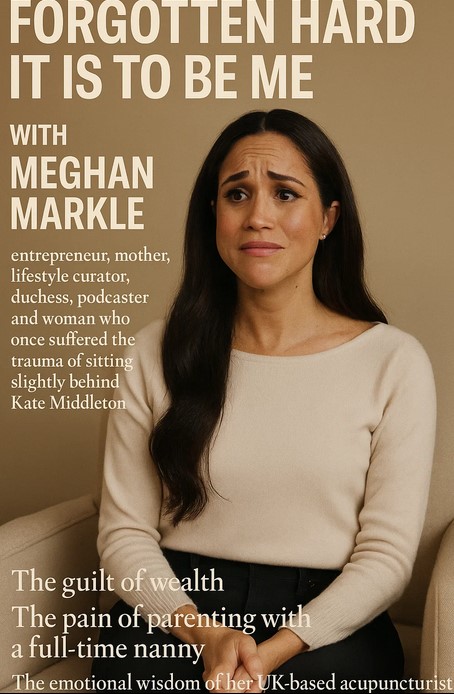Meghan Markle’s Struggle Is Real, Provided You Define ‘Struggle’ as Choosing Between Brands of Himalayan Salt
The Duchess of Sussex opens up about the hardship of motherhood, entrepreneurship, and not being adored by absolutely everyone all the time
GENERALPHILOSOPHY
Ed Grimshaw
5/27/20254 min read


There’s a certain breed of delusion that blossoms only in the Californian sun, fed by avocado, filtered lighting, and the unshakable belief that one’s personal diary is a gift to civilisation. Meghan Markle, Duchess of Montecito and CEO of Emotional Capitalism, has once again emerged from behind a cloud of Palo Santo smoke to remind the rest of us that she is, in fact, coping.
Not in the normal sense, like fixing a broken boiler while a child screams for spaghetti hoops, but in the rarefied, impossible-to-parody world of someone who believes adversity means hosting a podcast while being mildly aware of her children’s ages.
“People forget that Lili is three, and Archie is five,” she declared solemnly on the final episode of Confessions of a Female Founder—a title so catastrophically self-regarding it sounds like a rejected subtitle for Eat Pray Love 2: The Cash-Inning.
Yes, Meghan. We forgot. Along with your Spotify deal, your Netflix show, your tea towel range, and that time you said your royal life was like living in South Africa during apartheid. We are a forgetful species.
Motherhood as Performed by Someone Who’s Never Seen a Wet Wipe
This latest interview, with Spanx billionaire Sara Blakely (a woman who genuinely created something useful—tight pants that keep you from exploding out of your dress at a wedding buffet), was meant to showcase the burden of modern womanhood.
What it actually showcased was Meghan’s lifelong commitment to believing she’s the main character in a drama no one else is watching.
She talks about the past six years as a sort of tragicomedy of fertility and fatigue—“either pregnant or with a toddler or then another one”—as though this revelation might cause a national moment of silence.
But let’s be honest: Meghan’s concept of parenting hardship is akin to a dog describing the trauma of going on too many walks. Her children are raised in a home with a private chef, a full-time nanny, a global security team, and the kind of pastel nursery that looks like it came flat-packed from Heaven.
She’s not raising toddlers. She’s curating heirs.
Founder Fatigue, But Make It Fendi
She refers to herself—without irony—as a female founder. Which, in this case, means affixing her name to a series of branded affirmations printed on linen aprons and launching “As Ever,” a product line described as being “inspired by cooking, entertaining, and hostessing with ease.”
Hostessing with ease. The kind of ease that comes when your parties have caterers, your tablecloths cost more than a Ford Fiesta, and your closest encounter with stress is when your calligraphy pen runs out mid-manifestation journal.
Meghan has built an empire on the idea that she is just like you, if you were also a millionaire, married a prince, and lived in a Tuscan-style mansion full of emotionally vulnerable olives.
Guilt, Wealth, and the Dilemma of the Designer Mug
But let’s not ignore the heart of the matter: Meghan is burdened by wealth. Specifically, the female kind.
“There’s a guilt mentality surrounding having a lot,” she murmured, to the sound of a thousand overworked mothers throwing Tupperware at the radio. It's true. There is guilt around wealth. That’s why most people with proper money try to pretend they’re poor. You know—roll up in a battered Volvo, pretend you still shop at M&S.
Meghan, on the other hand, wears her guilt like a limited-edition scarf: carefully draped, expensively made, and mostly performative. She feels bad, but only in ways that can be discussed on-camera, packaged for Netflix, and repurposed into a mindfulness workshop.
Healing, One Vaguely Spiritual Anecdote at a Time
At one point, Meghan recalls a moment of enlightenment: “If the baby’s crying, treat the mother,” her acupuncturist once said. Because of course she has an acupuncturist. Probably two. One for actual needles, and one just to whisper affirmations into her drinking water.
This is Meghan’s worldview in miniature: problems aren’t to be solved, they’re to be narrated, preferably in velvet tones and with a lightly furrowed brow. Nothing is ever just “difficult.” It must become a journey. Even making a sandwich must be emotionally resonant and rooted in generational healing.
And behind it all, always, is the steely conviction that her suffering—be it royal, maternal, or balsamic—has meaning. She is a saint of inconvenience, canonised by her own PR team.
What Is She Really Selling?
Ultimately, what Meghan offers isn’t insight, or empathy, or even decent cutlery. It’s Meghan™. A brand forged in the crucible of tabloid trauma and reborn in the fires of lifestyle capitalism.
She doesn’t speak to real women. She speaks to an imaginary version of womanhood: someone rich, soft-spoken, self-obsessed, and profoundly incapable of laughing at herself.
And perhaps that’s the real tragedy here—not the trauma, not the toddlers, not even the podcast deals. Just the sheer, relentless earnestness of it all.
No irony. No edge. Just the belief that having two children and a personal staff makes you some kind of messianic soufflé of womanhood, destined to rise against the odds.
In Conclusion: Cry Me a Monogrammed River
So farewell, Duchess of Sussex, CEO of Self-Regard. May your next venture be even more introspective, even more expensive, and even less connected to reality.
And may someone, somewhere, quietly remind you: it’s possible to be grateful, rich, and relevant—without turning every napkin into a metaphor for oppression.
